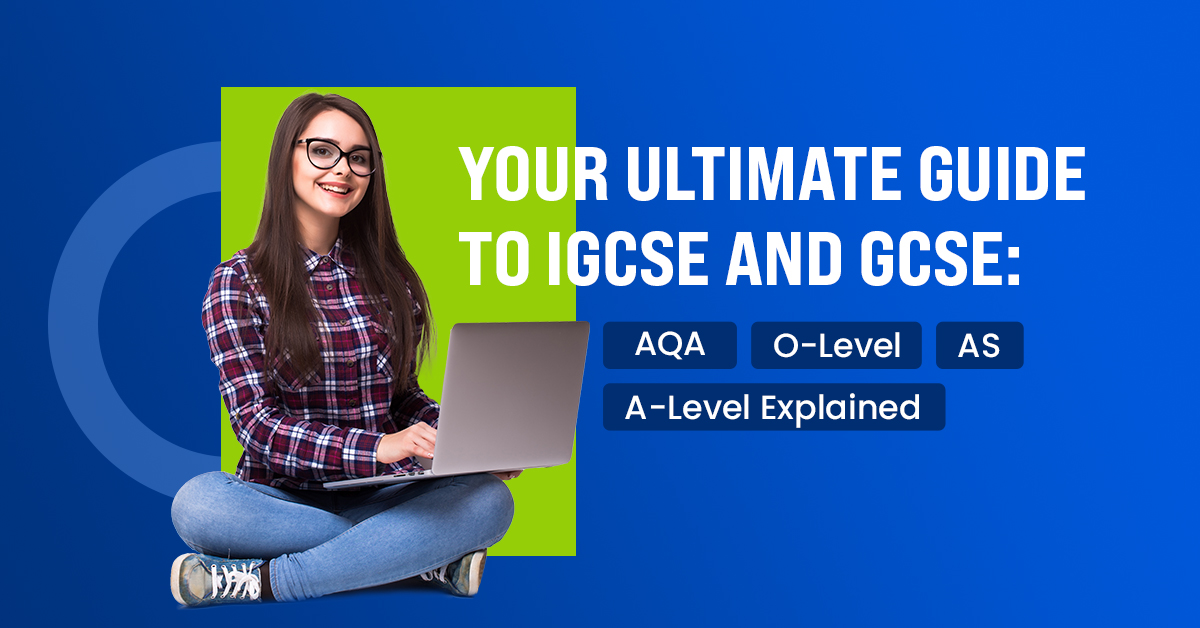
Your Ultimate Guide to IGCSE and GCSE: AQA, O-Level, AS, and A-Level Explained
When it comes to international schooling options, IGCSE in India and GCSE in India offer valuable pathways for students aiming for a globally recognized education. For students, parents, and educators, understanding the distinctions between these programs—including AQA, O-Level, AS, and A-Level—is essential to make the right academic choices.
This guide aims to shed light on what these qualifications entail and how you can maximise their benefits through customized tutoring in India or online courses in India.
What is IGCSE in India?
The International General Certificate of Secondary Education (IGCSE) is an internationally recognized qualification designed for 14–16-year-old students. Created by the University of Cambridge International Examinations (CIE), it offers a curriculum that prepares students for further education. Increasingly, IGCSE in India is gaining popularity due to its flexibility, comprehensive coursework, and emphasis on skill development.
What are the Levels of IGCSE in India?
IGCSE is India is often considered the equivalent of standard 10 in the Indian education system, bridging the gap between secondary school and more advanced qualifications like the A-Levels. While the IGCSE itself isn’t tiered into multiple levels, it serves as a foundation for progressing to the AS (Advanced Subsidiary) and A (Advanced) levels, or to O-Levels in select countries.
4 Key Points for IGCSE in India
1. Broad Subject Selection:
IGCSE offers a wide range of subjects, from mathematics and sciences to languages, humanities, and arts. This variety allows students in online IGCSE in India or classroom-based IGCSE to pursue interests and strengths, building a well-rounded profile.
2. Skill-Oriented Curriculum:
Unlike many local boards, IGCSE emphasises analytical thinking, problem-solving, and project-based learning.
3. Flexibility and Recognition:
The IGCSE is widely recognized across schools, universities, and employers globally. Many Indian students opt for online IGCSE in India as it offers flexibility in course schedules and formats.
4. Preparation for A-Levels:
Since IGCSE aligns closely with the AS and A-Level systems, students who complete IGCSE find it easier to transition to advanced studies. Institutions offering customised tutoring in India for IGCSE can support students in this transition by focusing on personalised learning plans.
What is GCSE in India?
The General Certificate of Secondary Education (GCSE), though commonly associated with the UK, is also pursued in India by students seeking an international standard of education. GCSE in India is similar to the IGCSE but with some curriculum and examination pattern differences.
Primarily following the AQA board, GCSE is available to students through some international schools and online GCSE in India programs, which help students gain a UK-based qualification from anywhere in the country.
Different Levels of GCSE in India
GCSE operates on a two-tier system: foundation and higher. This tiering allows students to tailor the difficulty level of their studies according to their capabilities. Once students complete their GCSEs, they can opt to continue with AS and A-Levels, which offer deeper subject knowledge and specialisation.
4 Key Points for GCSE in India
1. Core and Elective Subjects:
GCSE covers core subjects like English, Mathematics, and Science, along with a wide array of elective subjects. With online GCSE in India, students have the flexibility to explore diverse interests beyond the mandatory subjects.
2. Examination and Grading Format:
Similar to IGCSE, GCSE assessments evaluate both knowledge and practical skills. This grading structure allows students to gauge their strengths and identify areas for improvement.
3. Foundation for AS and A-Levels:
GCSE serves as a preliminary stage for those aiming to pursue AS and A-Level qualifications, essential for university admission in many countries.
4. Career-Readiness:
GCSE courses emphasise practical knowledge that aligns with real-world applications. This practical approach is a significant advantage for Indian students who wish to develop employable skills early on.
How The eTutor Home Supports IGCSE and GCSE in India
The eTutor Home specialises in customized tutoring in India for IGCSE and GCSE students. With expert tutors and flexible online courses in India, The eTutor Home provides tailored programs designed to meet each student’s needs.
Whether you are opting for online IGCSE in India or online GCSE in India, The eTutor Home’s platform ensures students receive focused guidance, live interaction with experienced educators, and access to a structured curriculum that aligns with international standards.
Conclusion
Choosing between IGCSE in India and GCSE in India can be a pivotal decision for students aiming for a strong academic foundation and global opportunities. Each qualification offers unique benefits, with both systems designed to equip students with essential skills and knowledge for higher education and beyond.
By opting for institutions like The eTutor Home, students can maximise their potential with customized learning support that aligns with global benchmarks.
Recent Posts
- Maximize Your IB Grades: Study Hacks from Dubai’s Top Online Tutors
- IB, GCSE, and A Levels Got You Stressed? Get Help with 1-on-1 Online Tutoring
- Your Ultimate Guide to IGCSE and GCSE: AQA, O-Level, AS, and A-Level Explained
- How to Ace IB DP & A Levels – Study Hacks for Indian Students
- How US Students Can Excel in IB DP, GCSE, and A Levels
- Everything You Need to Know About the AP Curriculum: Courses, Benefits & Exam Tips
